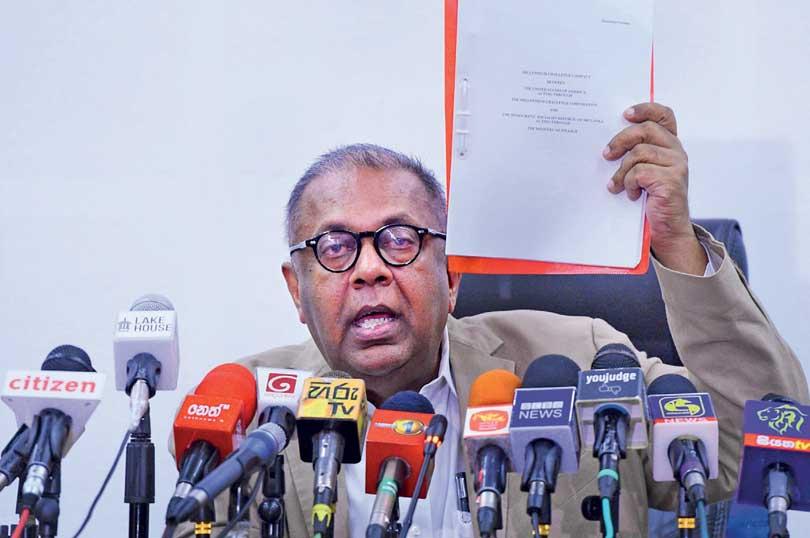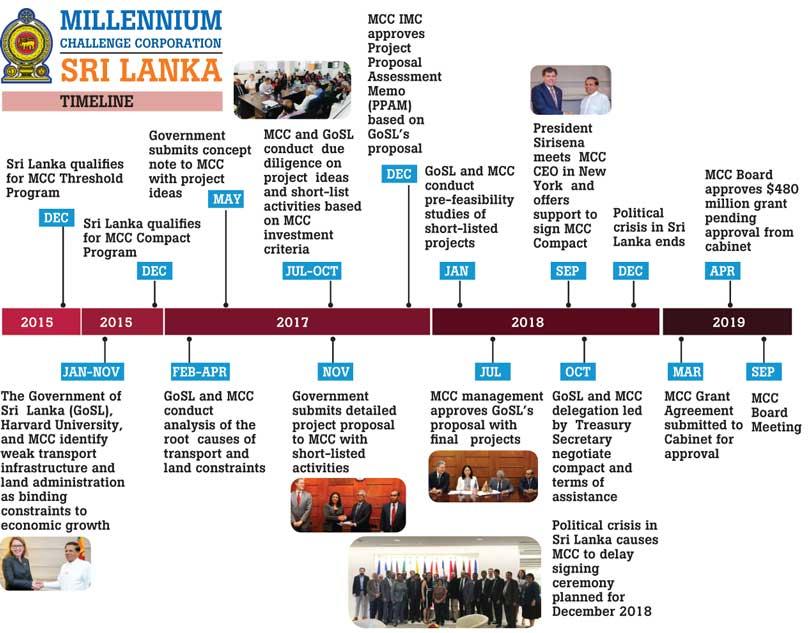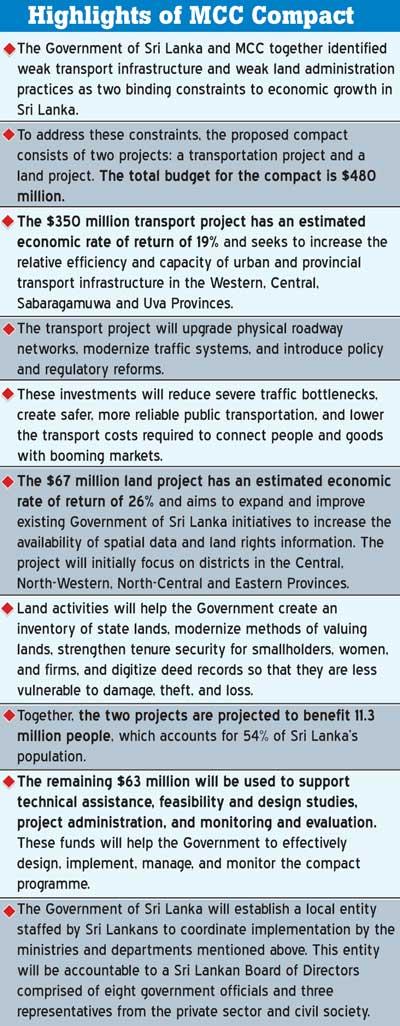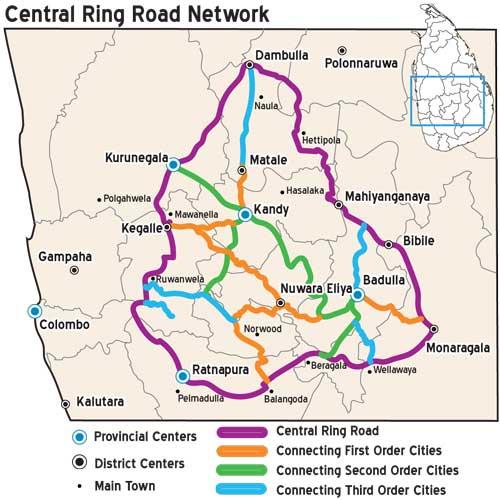08 Nov 2019 - {{hitsCtrl.values.hits}}

Sri Lanka’s Finance Minister Mangala Samaraweera shows a copy of a grant agreement with the United States as Sri Lanka prepares to pursue with the agreement that offers a grant under the Millennium Challenge Corporation.
(Photo AFP)
 Ever since the approval of the Millennium Challenge Corporation (MCC) USD 480 million grant for Sri Lanka, the country has been embroiled in a debate over it, with the government portraying it as something beneficial whilst the opposition is raising security concerns. This has left the common Sri Lankan citizen utterly confused. The Bar Association of Sri Lanka (BASL), and many politicians and civil organizations, have requested the Government to make the draft agreement public, for the benefit of the common citizen. In this backdrop, the Ministry of Finance released the MCC Draft Agreement on Friday (1 November). At the crucial juncture of a Presidential Election, MCC is used as a weapon to gain votes.
Ever since the approval of the Millennium Challenge Corporation (MCC) USD 480 million grant for Sri Lanka, the country has been embroiled in a debate over it, with the government portraying it as something beneficial whilst the opposition is raising security concerns. This has left the common Sri Lankan citizen utterly confused. The Bar Association of Sri Lanka (BASL), and many politicians and civil organizations, have requested the Government to make the draft agreement public, for the benefit of the common citizen. In this backdrop, the Ministry of Finance released the MCC Draft Agreement on Friday (1 November). At the crucial juncture of a Presidential Election, MCC is used as a weapon to gain votes.
What is the MCC?
According to the MCC website, the MCC is ‘an innovative and independent U.S. foreign assistance agency that is helping in leading the fight against global poverty.’ Established in 2004 by the US Congress, MCC’s goal is to deliver smart US foreign assistance through time limited grants which reduce poverty, promote economic growth and strengthen institutions, in a manner that makes the partner countries stable and prosperous, and in the process helping to enhance American interests. “MCC is mandated by the U.S. Congress to reduce poverty through economic growth. MCC grants – supported by U.S. taxpayer funds – have helped millions of people in the 29 partner countries where MCC has worked in. The United States also believes that healthy economies make for better trade partners,” stated Benjamin Baughman, Asst. Information Officer at the US Embassy.
MCC also reveals that they form partnerships with ‘developing countries committed to good governance, economic freedom and investing in their citizens.’ The assistance granted by MCC are of three types: Compacts, Concurrent Compacts for Regional Investments and Threshold Programmes. And their projects are aimed at tackling important issues developing countries face. These projects cover areas like:
MCC’s USD 480 million grant for Sri Lanka mainly deals with Transport Infrastructure and Land Rights and Access to Land. Sri Lanka became the 37th recipient of the MCC Grant.

MCC’s Selection Process and Why Did MCC Choose Sri Lanka?
The Selection Process
In a press statement by the Finance Minister, Mangala Samaraweera, he stated that discussions on the MCC Compact had started in 2002 and that in 2005, the then Government under President Mahinda Rajapaksa had tried to obtain the MCC Grant but he stated that attempts had failed due to allegations of HR violations and corruption.
Studying Sri Lanka’s scorecard for implementation of projects in the year 2005, it can be inferred that Sri Lanka didn’t rate well in the category of ‘Investing People’ and ‘Economic Freedom’ due to health expenditure, primary education expenditure, days to start a business and fiscal policy being below the median level, and thus couldn’t qualify for the grant.
According to media reports, the Pathfinder Foundation (PF) has stated that project negotiations commenced in 2004 and continued to the time of the Rajapaksa Government. until termination of the project by MCC in 2008 due to the escalation of the civil war.
The draft agreement states that Sri Lanka was selected to develop a threshold programme by the MCC in December 2015. During the development phase of the programme, the Government and the MCC had conducted a constraints analysis in collaboration with the Center for International Development, Harvard University. During this analysis, the high cost of transportation and access to land were seen as binding constraints.
“MCC’s competitive selection model uses a scorecard to determine how countries perform against their peers in the same income category on 20 different transparent, third-party indicators that measure economic freedom, ruling justly, and investing in citizens. Sri Lanka is a strong performer on the scorecard, which is part of why it was selected for the grant,” revealed Baughman.
After analyzing the score card and Sri Lanka’s performance on MCC’s policy indicators, MCC selected Sri Lanka to develop a compact. Following this, a compact development team was recruited and housed at the Prime Minister’s Office of Policy Development. In November 2017, the Government submitted project proposals focusing on the binding constraints. During the compact development process, the Government engaged in consultation with public officials, the private sector, civil society and developmental partners. Meetings were held with various Government. ministries and agencies, the Ceylon Chamber of Commerce and the American Chamber of Commerce in Sri Lanka.
Sri Lanka’s score card for implementation of projects in 2017, Sri Lanka was rated:
Economic Freedom
Ruling Justly
Investing in People
The agreement was due to be signed in December 2018, but due to the constitutional coup in October 2018 and the subsequent political turmoil in the country, the agreement was not signed.
When asked about the MCC grant and how it would continue past the 5 year period and on its implementation process, Baughman explained that MCC grants have an 18- 24 month design phase before the 5 years begin. “The grant will be overseen by a Sri Lankan Board of Directors and managed by a team of 65 Sri Lankan professionals. MCC expects and will encourage the Government of Sri Lanka to complete the grant and disburse the funds within the five-year window,” he added.
When asked whether the MCC Compact had any connection with the Status Of Forces Agreement (SOFA) or if there is any conditions or connections that are common in both, Baughman affirmed that there is absolutely no connection between the MCC grant and any proposed defence agreement.
Moreover, in response to a query raised on whether US companies can acquire lands through the MCC agreement since the agreement allows for foreign investors to purchase lands in Sri Lanka, Baughman stated that it was false and that the United States will not acquire or lease any lands under the MCC grant.
Countering concerns that the MCC Agreement threatens the sovereignty of Sri Lanka, he said that “in fact, by expanding economic opportunities for 11 million Sri Lankans, the MCC grant would help strengthen the country’s independence and sovereignty”.
When asked as to how the US as a country, would benefit from the Sri Lankan MCC Compact, Baughman said the following.
“As mentioned, MCC is mandated by the U.S. Congress to reduce poverty through economic growth. The United States also believes that healthy economies make for better trade partners. Sri Lanka is a close trade partner with the United States, which imports 25% of Sri Lanka’s exports. A prosperous Sri Lanka will ensure that our supply chains are protected. The United States also believes that providing foreign assistance is the right thing to do”.
Sri Lanka’s MCC Compact
The objectives of the Compact is to:

Transport Project
The following actions will be taken to fulfil the objectives of the transport project according to the draft agreement.
Also the Project consists of three activities: Advanced Traffic Management System (ATMS), Bus Transport Service Modernization (BTSM) and Central Ring Road Network (CRRN).
Transport Project concerns
The CRRN Project improves the road network of approx. 131km connecting Central, Sabaragamuwa, Uva and Eastern Provinces to the Western Province. This has sparked concerns regarding the link between Colombo and Trincomalee. According to media reports, at the public discussion organised by PF, independent analyst and author Neville Ladduwahetti is reportedly to have expressed, “With this MCC Compact, we are essentially revising the 2011-2013 National Physical Plan that covered five metro regions with a concept based on growth corridors. But there is also a significant variation from the plan that was approved earlier, i.e. when the revised National Physical Plan is compared against the MCC Compact. There’s a link between the Colombo-Trincomalee economic corridor and the MCC Compact.”
Former UN Permanent Representative, Dr. Palitha Kohona expressed his concerns to Daily Mirror. “Do we need a high speed transport link between Trincomalee, the largest deep water harbour in Asia and Colombo, our main airport and commercial centre. Is this a priority for the country?” he questioned.
Land Project
The land project is expected to increase tenure security and tradability of land for smallholders, women and firms through many policy and legal reforms. It is also stated in the draft agreement that existing Govt. Initiatives such as eSlims (Electronic State Land Information Management System), eLand Registry systems and the Bim Saviya program have been undersourced thus being unable to fulfill the full potential of the programme.
The Land Project is comprised of five activities: Parcel Fabric Map and State Land Inventory Activity, the Deeds Registry Improvement Activity, the Land Valuation System Improvement Activity, the Land Grants Registration and Deed Conversion Activity and the Land Policy and Legal Governance Improvement Activity.
The parcel fabric map is expected to cover up to 28% of land area in Sri Lanka and focuses on seven districts. It is intended to be the base map for an inventory of State Lands that come under it, helping the government decide the underutilized state lands. But the map may also cover geographic areas outside of the targeted seven districts and that would cover up to 67% of land surface area in the country.
Land Project concerns
It is stated in the agreement that MCC funding will support government’s efforts to convert State Lands’ permits and permits to ‘absolute land grants’. This would support the conversion of State Lands to the private domain, which would enable the use of land as collateral for loans and free transfer of lands without excessive government restriction.
It is further stated that the funding will also facilitate the conversion of private properties from the deeds system to the title registration system, continuing and improving the implementation of the Bim Saviya programme, which has been in effect since 2006.
The Bim Saviya programme had only managed to convert 600 000 properties but under the MCC funding, it is estimated that around 8 million properties will be converted. These activities have received apprehension from the public.
According to media reports on the PF discussion, Ladduwahetti noted that this activity could lead to a possible violation of Article 12 of the Constitution. “Since the Bill applies only to recipients of lands already granted, a certain proportion would have benefited from the existing schemes, while others would have found the asset to be a burden due to personal reasons. The latter group would more likely be inclined to sell their assets and be relieved of the burden. Since state land belongs to the Republic, and therefore to the people, the Bill would bring privilege to those citizens granted absolute clarity, at the expense of others,” he is reported to have stated.
Concerns have also been raised regarding the possible exploitation of these lands on the pretext of selling them, leading to foreign encroachment and infeasible development projects.
Conditions of the MCC Compact
Under Article 2, Section 2.7 in the draft agreement- it is stated that the MCC Funding shall not be used for any purpose that would violate US law and policy as specified in the Compact or notified to the government in writing. The Fund cannot be used for:
A diplomat’s view
Dr. Kohona stated that the secrecy surrounding this agreement seems like a challenge to national interests. “Although, in our practice, it is not necessary for a proposed treaty to be debated in Parliament before its conclusion, given the intense interest that the MCC Compact has generated, it would have been the proper democratic thing to do. It would be in the country’s interest to subject the MCC Compact to greater and transparent public debate before it is concluded,” he added.

Dr. Kohona also noted that the President had postponed signing this agreement before his trip to Japan and that it is a mystery the Cabinet had approved it just a fortnight before the Presidential Elections. “It is irregular and inconsistent with the Westminster tradition for an international agreement which has given rise to such fierce divisions within the country to be approved for signature in this fashion. It makes a mockery of democracy and accepted practice which we have all pledged to uphold. It is to be remembered that the opposition contender for the Presidency, Gotabaya Rajapaksa, has said in his policy statement that all international agreements entered in to by the present government will be reviewed after his victory,” he stated.
“Treaties can be concluded freely by countries and in fact thousands of bilateral and multilateral treaties have been concluded and registered with the UN under Article 102 of the Charter. While concluding a treaty is the sovereign right of a state, normally they are negotiated to protect the interests of both parties. A treaty that substantially benefits one party only is not normal in the international arena. While the USD 480 million grant might catch our immediate attention, the other provisions of the agreement need careful scrutiny,” he added.
He also informed that while the MCC Compact will enable Sri Lanka to receive a grant of USD 480 million, there is no commitment in the Compact on the part of the US to deliver this sum immediately. “In fact no MCC grant to any country has been delivered in this manner by the MCC. Congress has never approved the full amount committed by the MCC. Over 50 countries have been approved for grants by the MCC. 29 Compacts have been concluded, since 2004,” he revealed.
He raised the concern of the legal framework in the agreement. “The proposed Compact is an international agreement between the US and Sri Lanka, governed by international law, despite its extensive impact on transport infrastructure and public transport facilities, on land laws, land use, land alienation, etc. Disputes arising from the MCCC must be resolved by recourse to international law, not through our own judicial system,” he said.
Dr. Kohona also pointed out the fact that the MCC, its employees and the US Government are excluded from any liability arising from the implementation of the agreement and that MCC Funds are excluded from taxation and customs duties. “This is not exactly consistent with our sovereignty,” he said.
He also expressed his concern that the US could withdraw from the Compact with 30 days prior notice and would incur no liability for doing so and urges the Govt. to renegotiate these terms.
Advocata Institute’s Thought
Advocata Institute hosted the public forum on the MCC compact on 19 September 2019. The experts involved in designing the MCC Compact projects Prof. Amal Kumarage (Head of the Department of Transport and Logistics Management, University of Moratuwa), Dr. Saman Widanapathiranage (Deputy Director, Highway Designs at the Road Development Authority (RDA) and Mr. Sarath Jayatilaka (Former Deputy Surveyor General), MCC representatives: Ms. Jenner Endleman (Sri Lanka Resident Country Director - Millennium Challenge Corporation) and the Government, Dr Jagath Munasinghe (Chairman, Urban Development Authority) participated in the event. Speaking about the event and the MCC Compact, Aneetha Warusavitarana, Research Analyst at Advocata Institute stated that the MCC Compact focuses on Transport and Land Management activities. “MCC Compact appears to be a good source of finance. It’s a USD 480 million grant and would help in land and transport development projects that we’ve planned for the past 15 years,” she said.
She also emphasized that USD 350 million is allocated for transport and the projects would address the issue of traffic congestion. Some projects include modernizing bus services, road development along the central road link network, introducing an electronic service traffic management system to monitor traffic flow.
“MCC aims for poverty alleviation through economic growth” - Prof. Sirimal Abeyratne
On a positive note, Prof. Sirimal Abeyratne, Head of the Department of Economics, University of Colombo explained that the MCC known as the Millennium Challenge Corporation is accompanied with a grant, which is referred to as a Compact Grant. According to him, the Compact Grant’s objective is to reduce poverty through economic routes. “About 36 countries in the world have received the MCC grant and in the Asian region, Philippines, Indonesia, Nepal and Mongolia have received it. Now Sri Lanka has been offered the opportunity to receive it. Sri Lanka started preparing the projects, I believe around 2014,” he said.
Explaining that this is a five year agreement, which has to be completed within the given period, Prof. Abeyratne stressed that most of the negative comments that are shared at different media platforms including professionals, politicians and even among some scholars are false facts and are not found in the agreement. “Due to these negative comments being widespread among the audience, now there is substantial discontent against the agreement, which are based on baseless facts and are not related to the MCC Grant. The agreement is now released and the complaints and accusations against it do not stand true,” he said.
When inquired on how the project would help eliminate poverty, Prof. Abeyratne held the view that this project is one of the sustainable methods that could be employed to address the issue of poverty alleviation. Stating that in order to eliminate poverty, we should accelerate growth and make improvement, he highlighted that the aim is for poverty alleviation through economic growth. “Economic growth is the most fundamental element to eliminate poverty because it improves income and jobs. This is the sustainable way to eliminate poverty. And also the economic benefits of these two projects have been calculated,” he added.
Explaining on the benefits, he noted the sub standard, outdated and messy nature of Colombo’s public transport system, traffic system and infrastructure. “A modern public transport system, modern infrastructure and modern traffic management system are vital for a Colombo with less traffic; this will improve the efficiency and effectiveness of people. About 30 % of our population live in the Western Province now. So, that is one way of improving our economic growth, which would help in poverty alleviation,” he stated.
“Secondly, our land administration system is also outdated and messy and consumes a lot of time. Also, there is a lot of malpractices and abuse involved in this, including encroaching of lands and land disputes. Sri Lanka can improve the efficiency of land administration; that will also help to clear all these weaknesses of the sub standard, outdated system. Any information regarding lands will efficiently be available to any party, which will help the government to move into an efficient land administration system, that will help improve our economic growth. If anyone is interested in knowing the actual MCC grant agreement, rather than listening to various parties with vested interests, they should look at the agreement, which is released and available for the public now,” Prof. Abeyratne concluded.
28 Nov 2024 8 hours ago
28 Nov 2024 8 hours ago
28 Nov 2024 9 hours ago
28 Nov 2024 28 Nov 2024
28 Nov 2024 28 Nov 2024